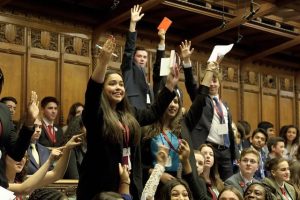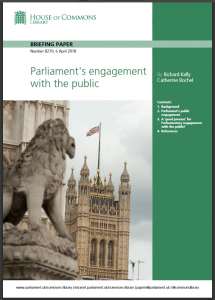 Parliament’s focus on engagement with the public has been relatively recent. Arguably the impetus for improving institutional engagement can be traced back to two reports. Connecting Parliament with the Public (House of Commons Committee on Modernisation of the House of Commons, 2004) and Members Only? Parliament in the Public Eye (Puttnam Commission, 2005) set out the need for greater engagement with the public. Since then, there have been a series of further reports emphasising the benefits of engagement, setting out plans and highlighting the progress that has been made.
Parliament’s focus on engagement with the public has been relatively recent. Arguably the impetus for improving institutional engagement can be traced back to two reports. Connecting Parliament with the Public (House of Commons Committee on Modernisation of the House of Commons, 2004) and Members Only? Parliament in the Public Eye (Puttnam Commission, 2005) set out the need for greater engagement with the public. Since then, there have been a series of further reports emphasising the benefits of engagement, setting out plans and highlighting the progress that has been made.
Catherine Bochel was awarded a House of Commons Academic Fellowship in November 2016 to explore how Parliament engages with the public and whether procedural justice, essentially a ‘fair process’, is a useful framework of ideas against which it is possible to examine this.
The first stage of the research, published as a House of Commons Library Briefing, involved looking at the nature and extent of Parliament’s engagement with the public and highlighted that Parliament now engages with the public in a wide range of ways. In addition to the work of individual MPs and Peers, engagement forms a significant part of the work of services such as the Houses’ Enquiry Services, the Education Service and Parliamentary archives. It can be seen in a wide variety of activities, such as the use of social media, the broadcasting of Parliament on TV and online, digital debates, workshops and learning programmes, and other public engagement projects, such as UK Parliament Week and Vote 100.
nature and extent of Parliament’s engagement with the public and highlighted that Parliament now engages with the public in a wide range of ways. In addition to the work of individual MPs and Peers, engagement forms a significant part of the work of services such as the Houses’ Enquiry Services, the Education Service and Parliamentary archives. It can be seen in a wide variety of activities, such as the use of social media, the broadcasting of Parliament on TV and online, digital debates, workshops and learning programmes, and other public engagement projects, such as UK Parliament Week and Vote 100.
The second stage is focusing on a number of forms of engagement, including select committees, individual MPs and Peers, and Outreach. It draws on observations, interviews and documentary analysis.
Catherine presented a paper on her research at the Political Studies Association annual conference in April 2019, ‘Procedural Justice: A Fair Process for Public Engagement with Select Committees’.
You must be logged in to post a comment.